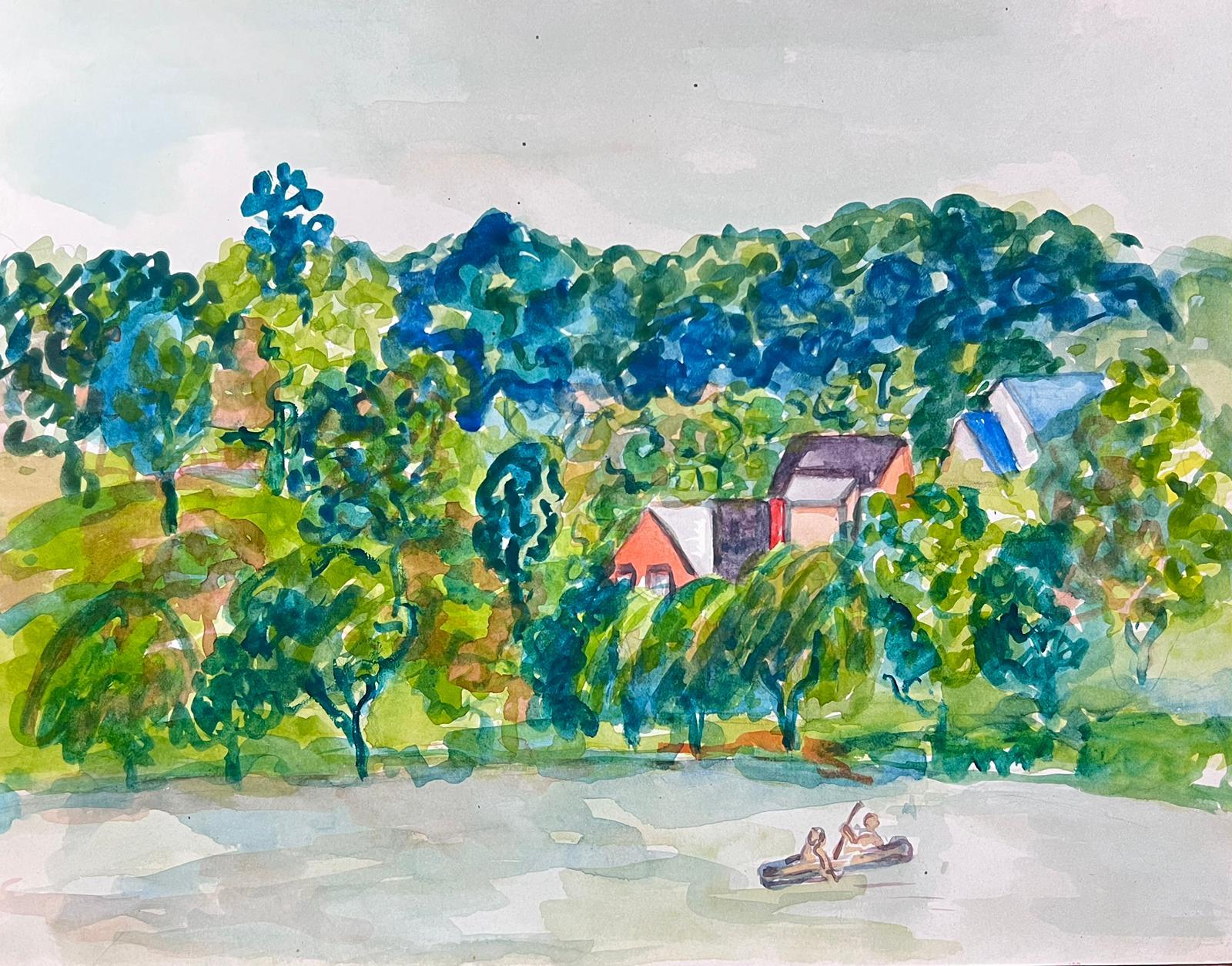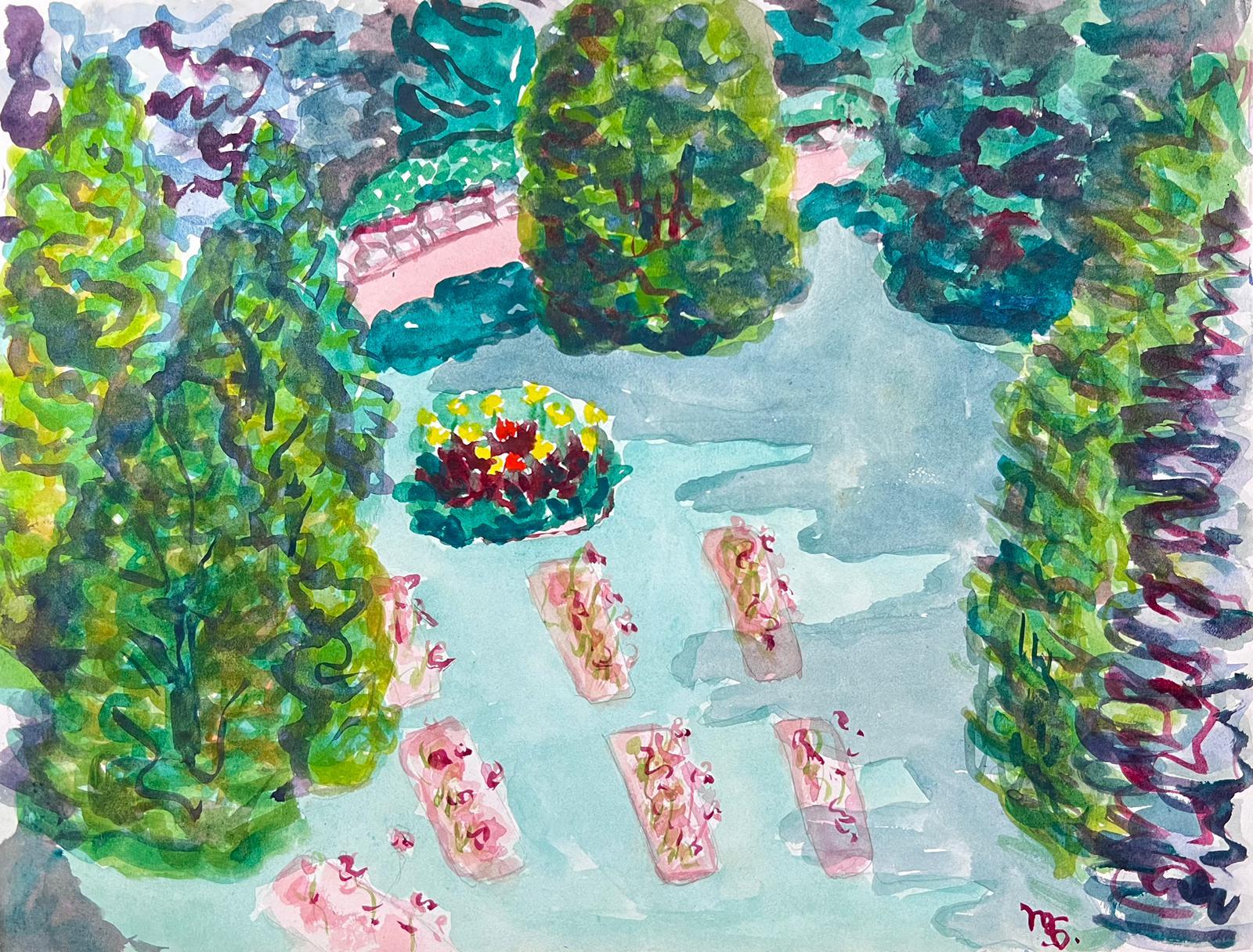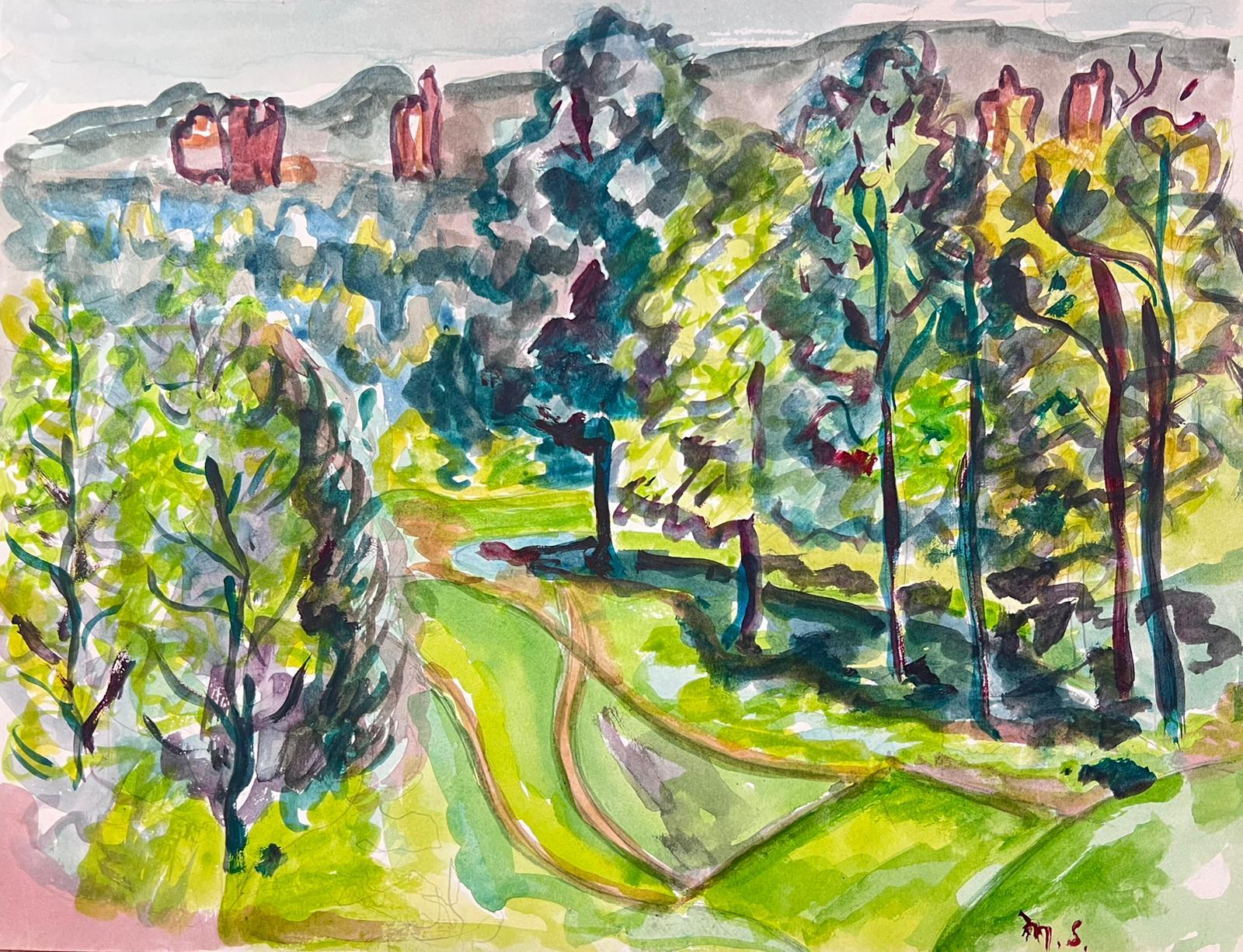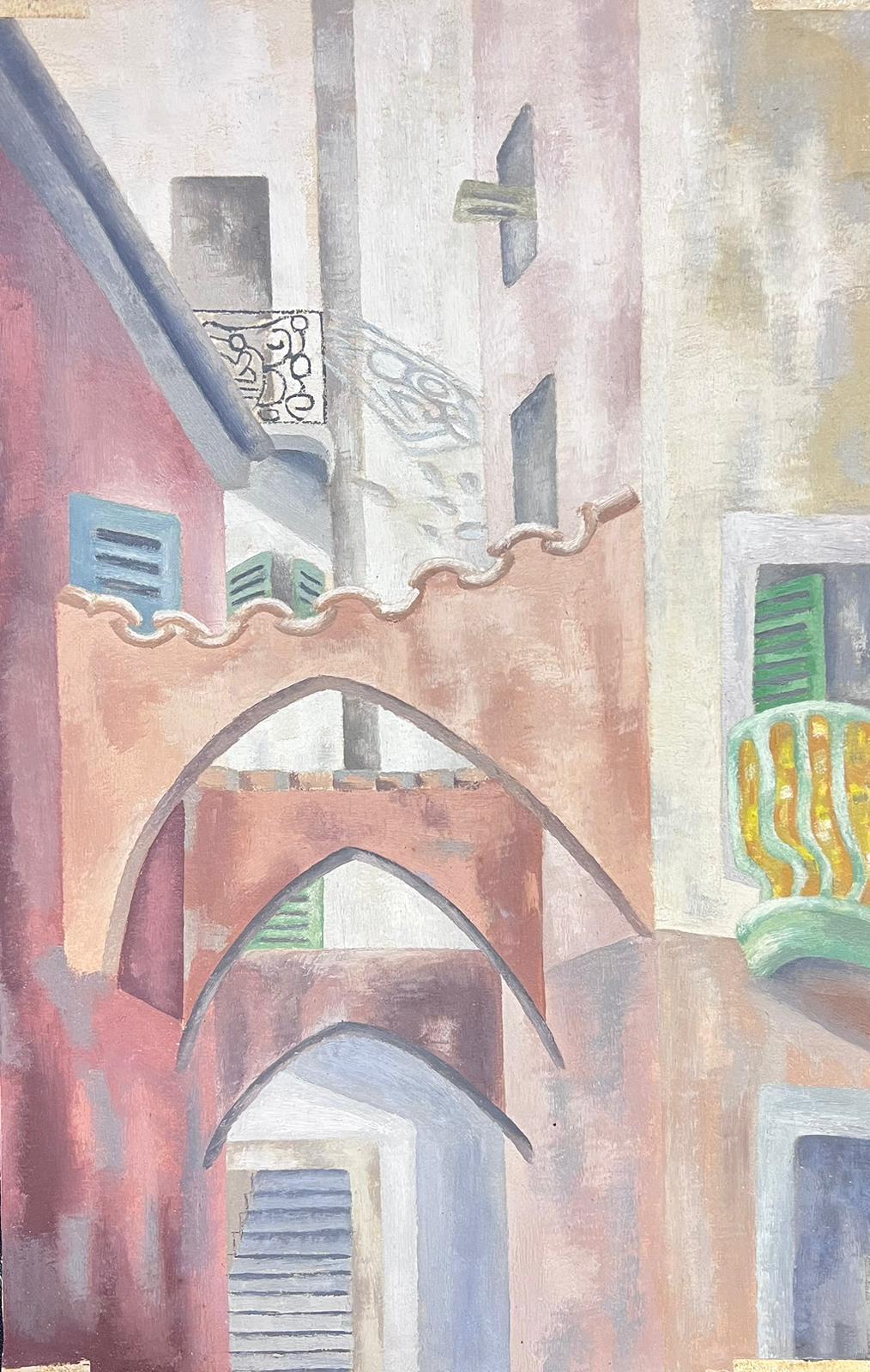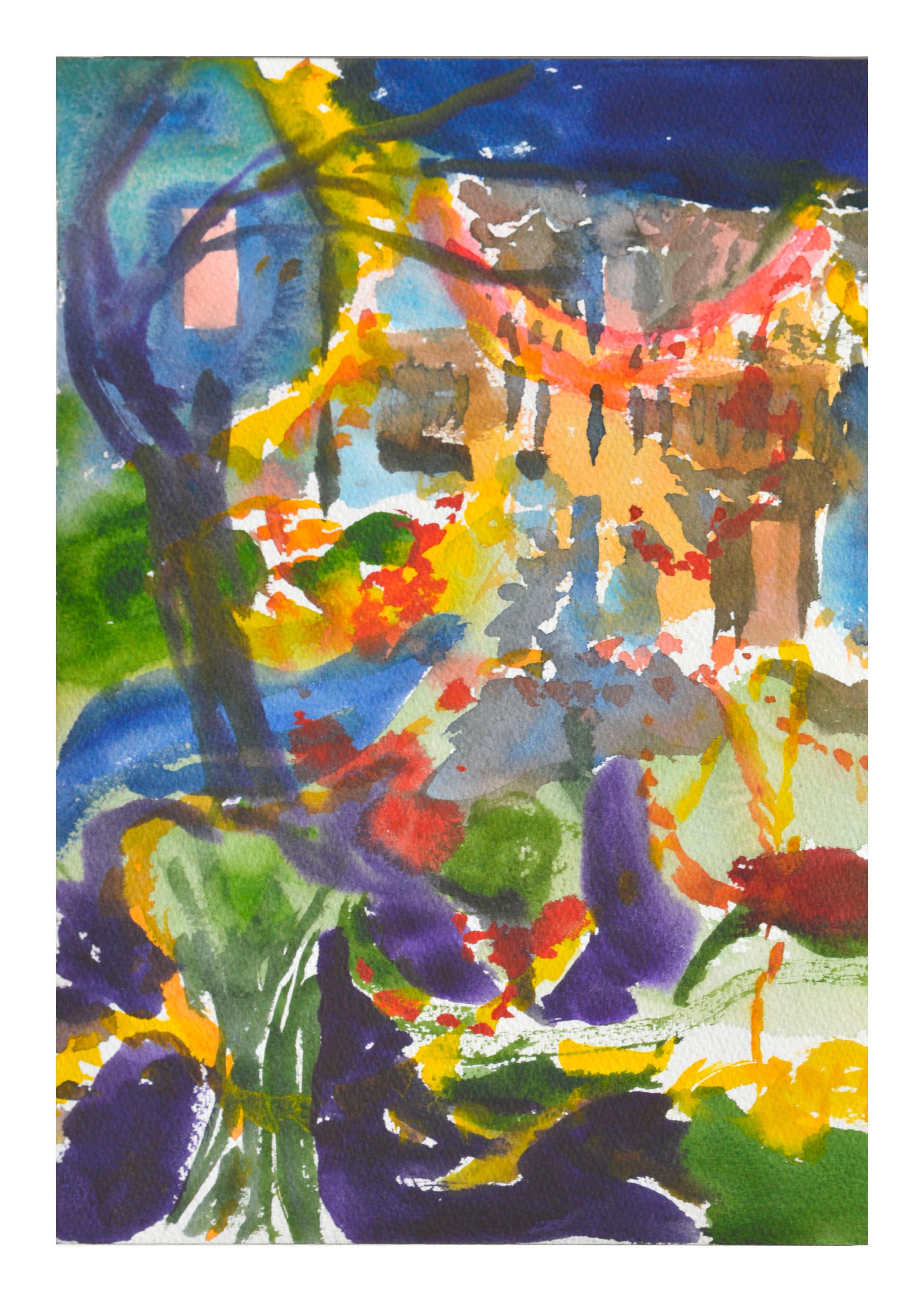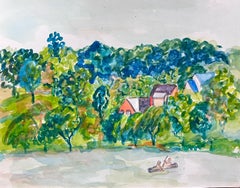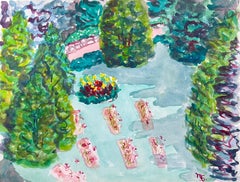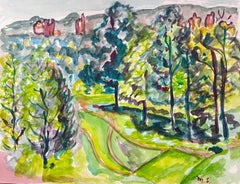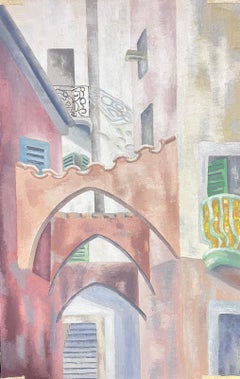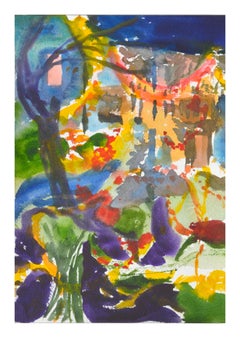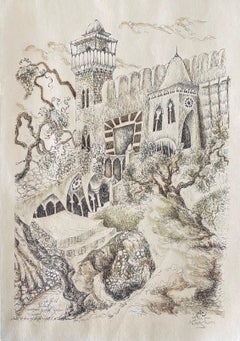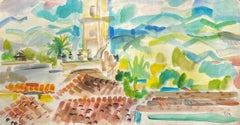Items Similar to Whimsical Watercolour of an Abstract Architectural Scene with Unique Details
Want more images or videos?
Request additional images or videos from the seller
1 of 9
Marjorie Schiele (1913-2008)Whimsical Watercolour of an Abstract Architectural Scene with Unique Details
$260.89
£190
€222.37
CA$359.92
A$395.65
CHF 207.94
MX$4,804.65
NOK 2,593.95
SEK 2,457.59
DKK 1,659.60
About the Item
Abstract Architectural Scene
original watercolour painting on artist paper
by Marjorie Schiele (1913-2008) *see notes below
piece of paper is 14 x 10 inches
In good condition
provenance: from a private collection in Paris
Schiele, was Cincinnati-born and educated, but lived most of her life in Paris and Monte Carlo. Schiele studied art in France and traveled extensively until she fled from Europe to New York in 1940 due to World War II. In New York she became a student and assistant to the French painter and writer Amédée Ozenfant. Ozenfant introduced Schiele to a band of expatriate artists which included Piet Mondrian, Fernand Léger, Marcel Duchamp, Lyonel Feininger, and Max Ernst, amongst other notables. Schiele returned to France in 1952 and exhibited her paintings in both solo and group exhibitions, but never forgot her Cincinnati roots. She created an endowment to benefit the Cincinnati Art Museum, from which the Marjorie Schiele Prize was established. The Prize will support an exhibition of paintings and sculpture by a living artist triennially. The Cincinnati Arts Museum has a large collection of her original paintings.
- Creator:Marjorie Schiele (1913-2008) (1913 - 2008, American)
- Dimensions:Height: 14 in (35.56 cm)Width: 10 in (25.4 cm)
- Medium:
- Movement & Style:
- Period:
- Condition:
- Gallery Location:Cirencester, GB
- Reference Number:1stDibs: LU509313481732
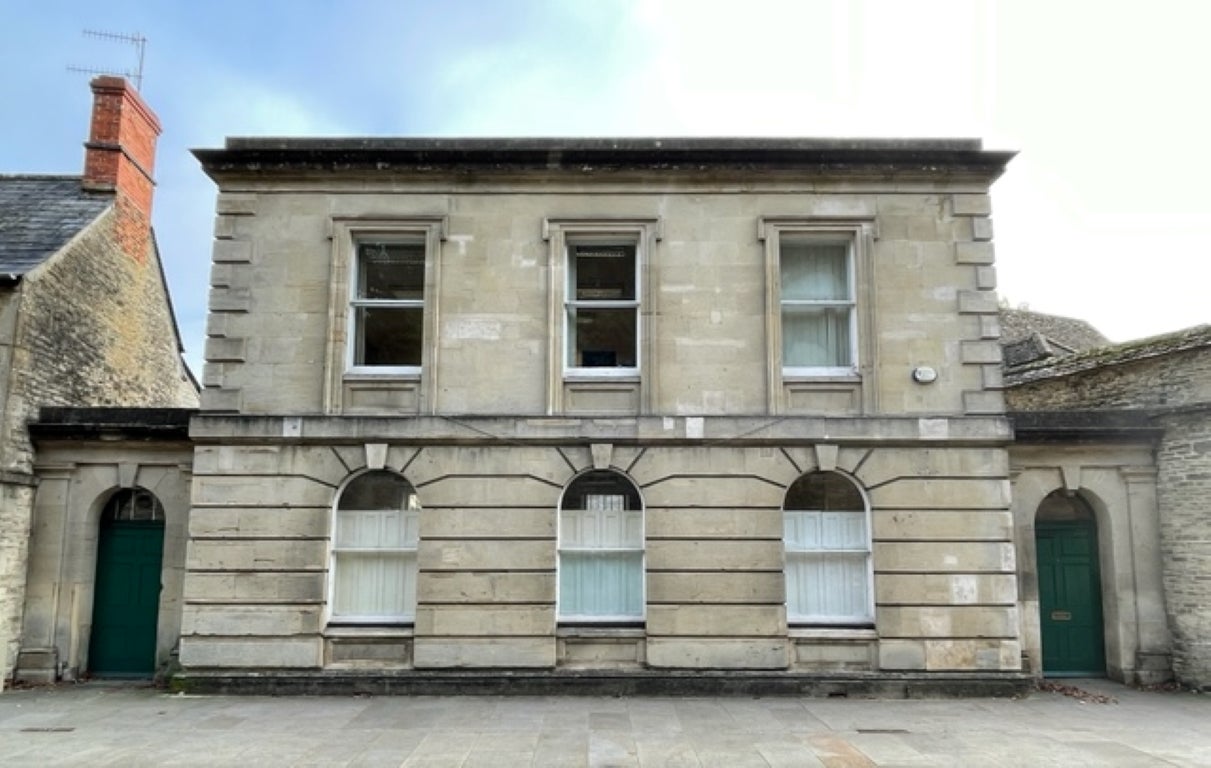
About the Seller
5.0
Platinum Seller
Premium sellers with a 4.7+ rating and 24-hour response times
Established in 1989
1stDibs seller since 2016
4,816 sales on 1stDibs
Typical response time: 1 hour
- ShippingRetrieving quote...Shipping from: Cirencester, United Kingdom
- Return Policy
Authenticity Guarantee
In the unlikely event there’s an issue with an item’s authenticity, contact us within 1 year for a full refund. DetailsMoney-Back Guarantee
If your item is not as described, is damaged in transit, or does not arrive, contact us within 7 days for a full refund. Details24-Hour Cancellation
You have a 24-hour grace period in which to reconsider your purchase, with no questions asked.Vetted Professional Sellers
Our world-class sellers must adhere to strict standards for service and quality, maintaining the integrity of our listings.Price-Match Guarantee
If you find that a seller listed the same item for a lower price elsewhere, we’ll match it.Trusted Global Delivery
Our best-in-class carrier network provides specialized shipping options worldwide, including custom delivery.More From This Seller
View AllBright Idyllic Watercolor Landscape of a Lakeside Village with Canoeists
Located in Cirencester, Gloucestershire
Idyllic Watercolor Landscape
original watercolour painting on artist paper
signed by Marjorie Schiele (1913-2008) *see notes below
piece of paper is 9.5 x 12 inches
In good condition...
Category
Early 20th Century American Impressionist Landscape Paintings
Materials
Watercolor
A Colourful Garden Scene Captured in Watercolour French Mid 20th Century
Located in Cirencester, Gloucestershire
A Colorful Garden Scene
original watercolour painting on artist paper
signed by Marjorie Schiele (1913-2008) *see notes below
piece of paper is 9.5 x 12.5 inches
In good condition
p...
Category
Early 20th Century American Impressionist Landscape Paintings
Materials
Watercolor
Vibrant Watercolor Landscape of a Sunlit Forest and Rolling Hills
Located in Cirencester, Gloucestershire
Vibrant Watercolor Landscape
original watercolour painting on artist paper
signed by Marjorie Schiele (1913-2008) *see notes below
piece of paper is 9.5 x 12.5 inches
In good conditi...
Category
Early 20th Century American Impressionist Landscape Paintings
Materials
Watercolor
Mid 20th Century Architectural City Back Streets Modernist Cubist Oil Painting
Located in Cirencester, Gloucestershire
City Streets
by Marjorie Schiele (1913-2008) *see notes below
oil on card laid on board is 18 x 11.75 inches
In good condition
provenance: from a private collection in Paris
Schiele...
Category
Early 20th Century American Impressionist Landscape Paintings
Materials
Oil
Set of 6 Figure Illustrations Egyptian Classical Characters Listed American
Located in Cirencester, Gloucestershire
Set of x6 figures
original watercolour painting on artist paper
signed by Marjorie Schiele (1913-2008) *see notes below
piece of paper is 14 x 10 inches
In good condition
provenance:...
Category
Early 20th Century American Impressionist Figurative Paintings
Materials
Watercolor
1930's French Village On Top Of Cliff Watercolour Landscape
Located in Cirencester, Gloucestershire
French Landscape
by Louise Alix (French, 1888-1980) *see notes below
provenance stamp to the back
watercolour painting on artist paper, unframed
signed initials
measures: 6 high by...
Category
Mid-20th Century Impressionist Landscape Paintings
Materials
Watercolor
You May Also Like
Abstract Cityscape Watercolor
By Les Anderson
Located in Soquel, CA
Abstract cityscape watercolor with loosely defined landscape elements and geometric shapes by Les (Leslie Luverne) Anderson (American, 19...
Category
1980s Abstract Expressionist Abstract Drawings and Watercolors
Materials
Paper, Watercolor
$223 Sale Price
20% Off
Architectural - Original Watercolor on Cardboard - Early 20th Century
Located in Roma, IT
Architectural is an original drawing in watercolor applied on a black cardboard realized by an unknown artist of the 20th Century.
The State of preservation is good, except for som...
Category
Early 20th Century Modern Figurative Drawings and Watercolors
Materials
Watercolor, Cardboard
Hebron, 1969 Israeli Judaica Mixed Media Lithograph With Watercolor
By Baruch Nachshon
Located in Surfside, FL
Baruch Nachshon, was born in Mandatory Palestine in 1939, in the city of Haifa.
Nachshon began to paint in early childhood, and developed his relationship to art and to artists throu...
Category
20th Century Modern Landscape Drawings and Watercolors
Materials
Watercolor, Lithograph
A Vibrant, Colorful Mid-Century Watercolor of Village Rooftops by Rudolph Pen
Located in Chicago, IL
A Vibrant, Colorful Mid-Century Watercolor of Village Rooftops by Noted Chicago Artist, Rudolph T. Pen. Depicting a tropical hillside village of terracotta rooftops nestled beside a...
Category
Mid-20th Century American Modern Landscape Drawings and Watercolors
Materials
Paper, Watercolor
French Jewish Post Holocaust Abstract Painting Manner of Hundertwasser Art Brut
By Jichak Pressburger
Located in Surfside, FL
Jichak Pressburger, Painter. b. 1933, Bratislava, Czechoslovakia. A concentration camp survivior. Came to Israel aboard the ship, "The Exodus". 1964 Went to Paris. In 1979 Returned as new immigrant.
Education Tel Aviv University, B.A. in art, with Marcel Janco and Isidor Ascheim at Avni art school.
Beaux Arts, Paris with Professor Coutaud.
Itzchak Pressburger
Stays in Paris from 1963 – 1979, Resident of the “Cité des Arts” 1969-1972. Lives and works in Jerusalem since 1979.
One-Man Exhibitions
1963 Gallery Dugit, Tel-Aviv
1968 Cultural Center Enkhuizen, Netherlands
1968 Gallery Zunini, Paris (chosen by the art critic of « Opus : Jean-Jacques Lévèque)
1970 Gallery Zunini, Paris
1973 Gallery Maitre Albert, Paris. Cultural Center Verfeil sur Seye, France
1974 Gallery Maitre Albert, Paris
1976 Gallery Mundo, Barcelone
1980 Artists’ House, Jerusalem
1981 Gallery Alain Gerard, Paris
Group Exhibitions
1966 Rathaus Charlottenburg, Berlin. (The first show of Israeli painters in Germany
Artists Center of Silvarouvres, Nantes, Ffance
XXXth Salon of Finances at “l’Hotel des Monnaies”, Paris
1969 Maison de Culture, Le Havre, France
1968 Gallery Zunini, Paris (chosen by the art critic of « Opus : Jean-Jacques Lévèque)
Salon « Grands et Jeunes d’Aujourd’hui », Paris
Museum of Fine Arts, Nantes, France
Cultural Center Vitry, France
Gallery Il Giorno, Milan
Cité des Arts, Paris
1972 Salon “Grands et Jeunes d’Aujourd’hui”, Paris
Salon de Mai, Paris
1973 Städtische Galerie, Siegen, Germany
1974 Jewish Cultural Center, Paris
Publicis, Paris
1975 Réalitiés Nouvelles, Paris
1976 Salon de Mai, Paris
1977 “Perspectives Israeliennes”, Grand Palais, Paris
1981 Salon Alain Gerard, Paris
1984 Artists’ House, Jerusalem
Publication
1990 Haggadah Yom Kippour (Hebrew/French) Abraham Bliah (private edition), Paris
Acquisitions
1968 The City of Paris
1972 The State of France
The Yitzchak Pressburger artist was born in Bratislava – known for centuries by its German name of Pressburg – but the outbreak of World War II found him and his family in Prague. His father realized they had to escape from the Nazi occupiers and tried to get the family across the border into Hungary. However, they were caught near the crossing point, arrested and incarcerated overnight at the nearby railway station. The Czechs put them on a train to Hungary early the next morning. That was their first miracle in their quest for survival.
They survived with relative ease until late 1943, when the father was taken away to a forced labor camp. He subsequently died in a death march. Things became even more precarious in early 1944, when the Holocaust made its full-blown presence felt in Hungary.
“It wasn’t the Germans, it was the Hungarian Nazis who did the dirty work,” Pressburger points out. The family lived in so-called “safe houses” that were protected by Switzerland, Finland and Sweden. The havens were dismantled in late 1944, and the Pressburgers moved into one of the two Jewish ghettos in Budapest. The Nazis had found two houses with Jews, including the one where we had been, and took them all out and shot them next to the Danube. Today there is a monument by the river [called Shoes on the Danube Bank]. We should have been with the Jews who were killed by the river,” he says.
After the war, Pressburger and his siblings were farmed out to various orphanages run by the Jewish Agency, and things took a decidedly better turn.
“We finally had food to eat,” he recalls. “After a while we were put on trains that were protected by the Jewish Brigade [of the British Army], and we were sent to Austria, and then to Germany.”
“My uncle was a famous artist, and I learned a lot from him,” he says. While in Germany, Pressburger also took some lessons with a local artist.
His mother managed to get him and two of his siblings berths on the Exodus, which set sail from Marseilles for Palestine in July 1947. Pressburger was 13 at the time and clearly recalls the aborted attempt to get to the Promised Land.
“It was so crowded on the boat. This was a ship that was made to ply rivers in the United States, with a few hundred people on board, and we had over 4,500 passengers crammed in.”
As we know, the British prevented the Exodus from docking in Palestine, and the passengers were shipped – in three far more seaworthy vessels – back to France. After the French government refused to cooperate with the British, Pressburger and the others found themselves back in Germany. The teenager eventually made it here in 1948, just one month before the Declaration of Independence.
After a short furlough in Tel Aviv, during the first lull in the fighting in the War of Independence, he moved to Kibbutz Kfar Ruppin, where he worked in the cowshed. All the while he continued feverishly drawing and honing his artistic skills, which he says came in handy when he joined the IDF.
After completing his military service, which included a spell as one of the founding members of the Flotilla 13 naval commando unit, he worked in Sdom for a while at the Dead Sea Works before starting his formal arts training in earnest.
I was in the first group of students at the Avni Institute [in Tel Aviv],” he says. “There was quite a famous bunch of students and teachers like Moshe Mokadi and Isidore Ascheim and Aaron Giladi.”
In such illustrious company, one might have thought Pressburger was set to unleash his burgeoning talents on art connoisseurs across the globe, but it was a while before that happened.
Pressburger arrived in the French capital in 1964 and spent close to 15 years there, with a short interlude in Germany, before returning to Israel. His time in Paris was a professionally rewarding period of his life, and he also found love.
“[Avni Institute teacher] Yochanan Simon gave me the name and address of a French-Israeli family in Paris, but when I got to the house, a young woman opened the door and told me the family was on vacation in Israel,” he explains. Despite missing his expected hosts’ welcome, he and the German-born young lady who greeted him soon fell for each other, and romance quickly led to wedding bells. By all accounts, Pressburger did well in Europe. He secured a rare three-year berth at Cité Internationale des Arts, where artists are normally provided with accommodation and studio space for between two months and a year. He was also accepted to the prestigious Beaux Arts academy of fine arts, mounted solo exhibitions, and took part in group shows all over Europe.
One of these last was a group exhibition at Rathaus Charlottenburg in Berlin in 1966 – the first exhibition of Israeli artists in Germany after the Holocaust. When he arrived in Berlin, the lineup for the Israeli show was already signed and sealed, but somehow his work came to the attention of the German culture minister, who arranged for him to join. The Pressburgers’ year-long sojourn came to an abrupt end following an encounter he had one day while walking through the crowded Berlin streets...
Category
1960s Expressionist Abstract Paintings
Materials
Canvas, Oil
Landscape - Original Watercolor signed "Chantau Reclan" - Early 20th Century
Located in Roma, IT
Landscape is an original modern artwork signed "Chantau Reclan".
Original colored watercolor on paper.
Hand-signed by the artist on the lower right.
Good conditions.
Category
Early 20th Century Modern Landscape Drawings and Watercolors
Materials
Watercolor
More Ways To Browse
Feininger Lyonel
Oil 1903
Painting Oil Moors
Pink Cherry Blossom
Pink Sky Paintings
Susan York
19th Sunset Landscape
English Pastoral
Large Seascape Painting
Norfolk Broads
Oil Painting Surf
Rare Antique Oil Painting
Winter Morning
Aspen Tree
California Oil Painting Midcentury
De Lorenzo
Dutch Golden Age Painting
English Cottage Painting
